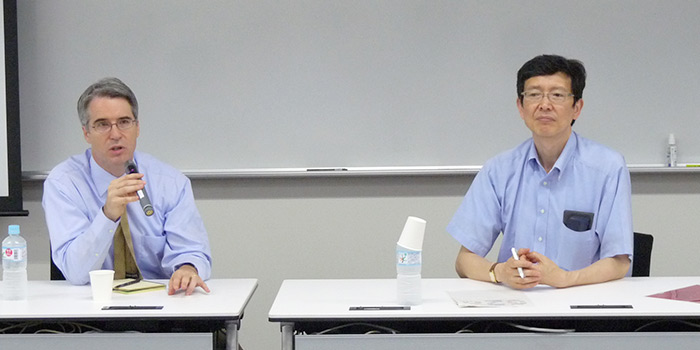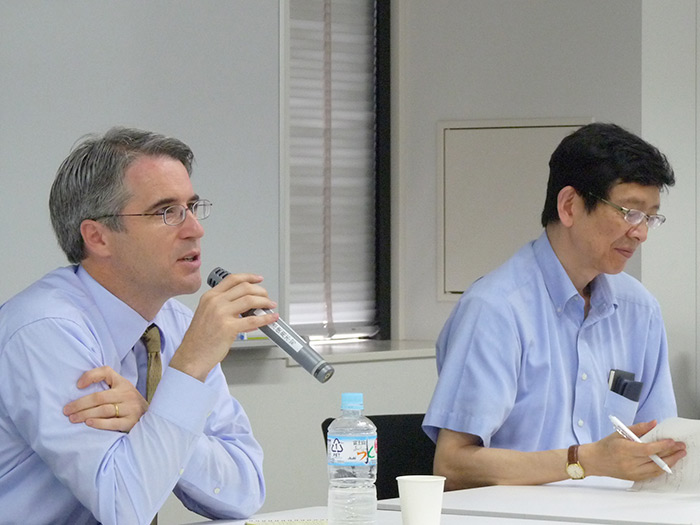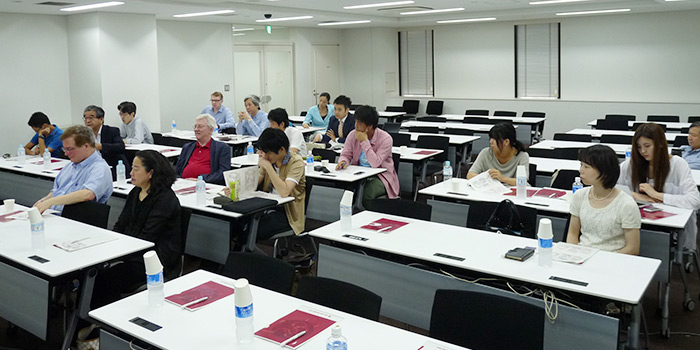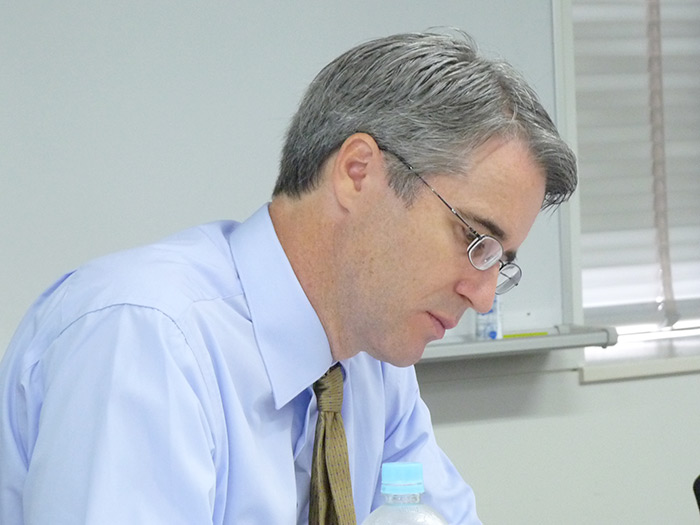SSU Forum with Professor William W. Grimes
| Date: | Tuesday, June 10, 2014, 10:30-12:00 |
|---|---|
| Venue: | Kojima Conference Room, 2nd floor, Kojima Hall |
| Subject: | “East Asia Goes Venue-Shopping: When Global Influence Does Not Reinforce Regional Solidarity” |
| Lecture: | William W. Grimes, Professor of International Relations at Boston University |
| Language: | English |
| Hosted by: | Security Studies Unit, Policy Alternatives Research Institute, the University of Tokyo |
| Co-hosted by: | The Economy-Security Nexus |
The SSU hosted a talk within the framework of the SSU Forum delivered by William Grimes, Professor of International Relations at the Boston University, under the title “East Asia Goes Venue-Shopping: When Global Influence Does Not Reinforce Regional Solidarity.”
The SSU Forum was chaired by Professor Keisuke Iida. He introduced Professor Grimes as a leading expert on monetary policy in East Asia and East Asian regionalism.
Professor Grimes opened his talk by explaining how the topic of the presentation he was about to deliver took shape, namely as a preparatory work for an article he is currently writing on regional representation at global level, in turn based partially on already published work.

The topic of this project has to be contextualised in the emerging trends of global politics in relation to Asia. As East Asian nations are becoming more important in economic and political terms, their representation in global fora has been equally expanding. Indeed, while in the G7 there was only one member originating from this region of the world, namely Japan, there are now four East Asia states sitting in the G20 (Japan, China, Korea, and Indonesia). It is arguable that the East Asians are simply gaining the level of representation which mirrors their status, in contrast to European nations, which appear currently to be very overrepresented in almost every globally relevant context.
Against this background, Professor Grimes has articulated his research question as “Will increased East Asian representation at global level reinforce regional cooperation?” The proposed paper intends to develop a framework for understanding the global-regional interrelations which suggest that a virtuous cycle is unlikely for the medium term. Variables for the explanation of the linkage between regional cooperation and global representation are identified as commonality of interests, voice, and regional power configuration. Commonality of interests depends on the nature of the issue, on access to public/collective goods, and on linkage opportunity. “Voice” consists in the number of countries having direct access to representation at global level. Regional power concentration reflects the number of powerful actors within each region. The main argument of the planned paper is that a virtuous cycle between regional cooperation and regional representation at global level depends on one hand on shared interest and expectation in continued regional integration/cooperation, and on the other on the ability to provide regional goods through a global voice. A virtuous cycle will instead break apart if interests across the region are too diverse, if political rivalry between countries having representative status is too intense, and if internal threat perception is high or growing.

Professor Grimes successively proceeded with a comparison between the situation in Europe and in East Asia. Europe appears to be highly integrated, with widely shared interests across a broad range of economic, political and social issues. Besides, there is a relatively low level of power concentration, as the region lacks a true hegemon, while the continent as a whole enjoys overrepresentation at global level, with multiple states being present in the most exclusive global fora. Besides, internal threats, in contrast to the pre-1945 era, are extremely limited.

East Asia is in a very different predicament: there is very limited integration, and overlapping areas of interest appear to be fairly circumscribed, mostly concerning the economic sphere. Power concentration is high, with a bipolar structure currently undergoing significant change. The region as a whole is gaining more global voice, but internal threats are rising after a long period of substantial calm.
By considering these factors, Professor Grimes predicts that East Asian regional cooperation will not be supported by the expansion of East Asian voice at global level. Japan will no longer be able to use its global voice to strengthen its regional leadership. Some regional actors will seek to use global voice to balance China’s rise; overall, East Asian states are expected to pursue a strategy of ad hoc regional and extra-regional cooperation.

-
Professor of International Relations at Boston University
